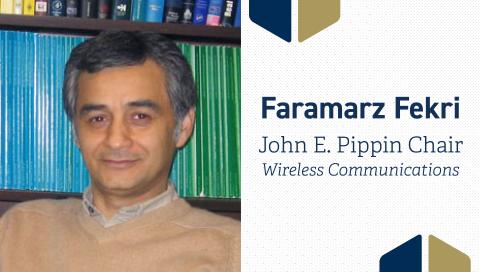Fekri's research aligns with semantic communication for AI and decision-making, which will play a vital role in future 6G wireless networks.
Faramarz Fekri has been named the John E. Pippin Chair in Wireless Communications in the Georgia Tech School of Electrical and Computer Engineering (ECE), effective June 1.
Fekri holds a B.Sc. and M.Sc. from Sharif University of Technology and a Ph.D. from Georgia Tech. He became an assistant professor in ECE in 2000, showcasing a strong dedication to research and teaching. He is a prominent figure in wireless communication, information theory, machine learning, and inductive logic reasoning. Over his career, he has secured more than 15 research awards from the National Science Foundation (NSF), including the prestigious NSF career award.
His work has resulted in 250+ peer-reviewed articles and a book publication by Prentice Hall. Notably, he has received three significant research awards in recent years for his contributions to wireless communications, including communication-efficient distributed learning, machine learning in wireless networking systems, and wireless network traffic reduction via learning. In 2015, he was honored as an IEEE Fellow by the Information Theory Society for his notable contributions to coding theory. In 2020, he was appointed as an ECE-GTRI (Georgia Tech Research Institute) Fellow.
Fekri's research aims to advance post-Shannon Era Communications, focusing on conveying information through interactive communication between senders and receivers. This concept aligns with semantic communication for AI and decision-making, which will play a vital role in future 6G wireless networks.
He envisions a transformative shift from "connected things" to "connected intelligence" in wireless networks, where AI empowers interconnectedness among humans, devices, and intelligence in a highly connected cyber-physical world. Fekri strives to gather experts in wireless communications, electromagnetics, devices and computing, robotics and control, and artificial intelligence to drive scientific breakthroughs and translate them into impactful advancements for 6G wireless networks.
Fekri's dedication extends to mentoring and training exceptional students. He has guided 17 Ph.D. graduates, with five securing faculty positions in the US and seven joining renowned research labs at companies like Google, Facebook, Amazon, Qualcomm, CISCO, and Samsung. His commitment to teaching has earned him the Class of 1934 Course Survey Teaching Effectiveness Award twice. As a result, he was recognized early in his career at Georgia Tech as the ECE Outstanding Junior Faculty Member. Additionally, he actively mentors junior faculty members, advocating for diversity and the recruitment of women and underrepresented groups in the faculty recruitment committee.
